I think the Russia-Ukraine conflict is less a “cause” of a change in the structure of the international system, and is instead more “reflective” of a change in the structure of the international system. The past decade witnessed the ending of the “unipolar moment” of US global supremacy and the return of a “multi-polar” word. Those poles were commonly viewed as the US, China, and Russia. But if the EU can continue to become a security provider, then it will have the economic and security weight (and unified foreign policy) to be another pole.
Similar, the “global order” was under strain well before the war. COVID19 made evident how the international institutions marking the “rules-based order” fostered during the 1990s and early 2000s was under stress, if not completely dysfunctional due to US-China rivalry. China’s non-committal response to the war, along with the clear North-South divide in the sanctions regime used against Russia, makes clear once again the fissures in the operation of the global order.
This war is a tragedy, but it’s been good for NATO. Since the end of the Cold War, there has been continual questioning of NATO’s relevance and purpose. While many Eastern European countries, fearful of a resurgent Russia, desired NATO membership and a continuation of the alliance, questions about the alliance were raised from time to time in some of the older members, including the United States. Russia’s invasion of Ukraine has set those questions aside. Indeed, Finland and Sweden joining the alliance are clear signs of the alliance’s continued perceived relevance.
Since the conflict broke out, Germany has increased its defense spending, Finland’s public opinion on NATO membership went through a major change, and Georgia applied to join the EU. Therefore, the key will be whether these changes continue. There is a real opportunity for Europe (the European Union specifically) to become a “security provider”, not just a “security consumer”. But this requires committing to the increase in defense spending and taking the lead in providing weapons and support to Ukraine and the nations on the “eastern flank” of NATO/the EU (such as the Baltic states and Finland).
If Europe does become a security provider, then this could have implications for East Asia. The United States would be able to divert resources to that region and away from Europe. This, in turn, would make it more difficult for China to potentially seek to seek territorial revisions in that region.
It could also have implications for the Greater Middle East. The past few years have witnessed the US pull back from the region in the hope of other nations taking on more of the burden, such as encouraging nations to band with Israel via the Abraham Accords. From the US perspective, that is a welcome trend. If the US is able to commit less resources to Europe and Russia is weaker due to loses from this war, could this allow the US to be more open to dedicating resources to the region.
I think Putin’s intention was to establish a “little Soviet Union” centered in Russia, Belarus and Ukraine, with Central Asian countries as a buffer zone. Putin’s first goal was regime change in Ukraine. If that had proven successful and relatively easy, he likely would have then annexed the whole of Ukraine. If that also proved relatively easy, I would not have been shocked to see him go further in his ambitions. He has said that the collapse of the Soviet Union was the greatest tragedy of the 20th century. We should believe that he means that and, hence, wanted to reverse it.
I worry that the Russia-Ukraine conflict will reach a point of stalemate, where both sides are dug in around a line of control in the east. This is a recipe for a protracted conflict, analogous to the Iran-Iraq war in terms of both duration and even eventual outcome (i.e. nothing ultimately changed). At this point, I am less concerned about trigger a larger-scale war. The NATO nations supporting Ukraine have demonstrated a keen ability to assist Ukraine without directly becoming involved in the fighting. At the same time, Russia, perhaps because their initial advances proved unsuccessful and the conflict has been more difficult than expected, seems careful to not trigger wider involvement in the war (such as by invading other nations).
However, I think there are several lessons which other countries can learn from the Russia-Ukraine conflict. One of the lessons was already learned by the US invasion of Iraq: conquering and occupying an entire country is extremely difficult. Same with trying to achieve “regime change” by force. It’s likely a fools errand.
The other lesson is the power of weaponizing the global economy. The sanctions imposed on Russia were swift, widespread, and punishing. It is difficult for a country to decouple from the global economy, so “going alone” is likely not an option. Therefore, if a country does wish to invade another country, it will need to be prepared for the economic hardships to come.
Other lessons remain to be learned. For instance, while the sanctions were swift, widespread, and punishing, can they be sustained? I’m not sure. I’m curious to see where things stand a year from now. Russia’s energy resources are vital to a host of countries. Will the desire to acquire those resources, perhaps as a means of relieving domestic economic hardships prior to an election, lead to fissures in the sanctions regime?
A key role of the media is to keep the public interested in the war. As interest in the war wanes, complaints about the economic hardships caused by the war and sanctions will rise. The desire to end those hardships could, in turn, put pressure on politicians to end the sanctions against Russia.

